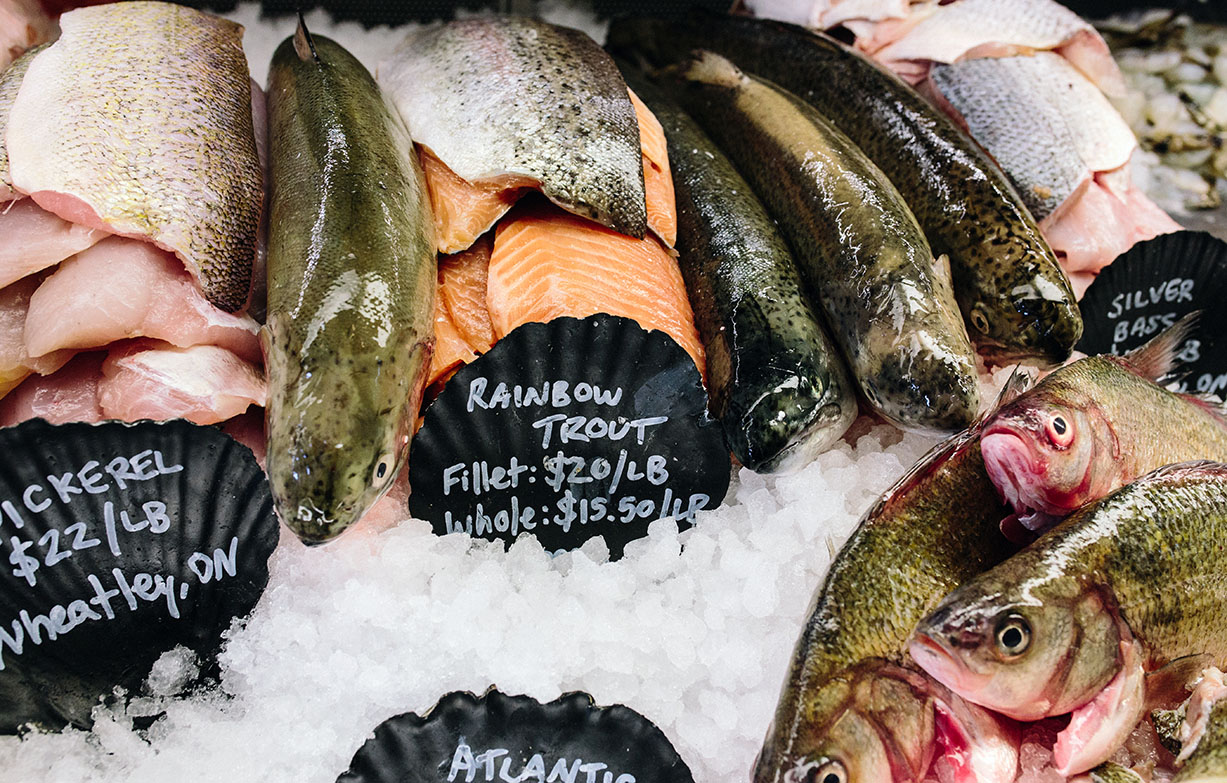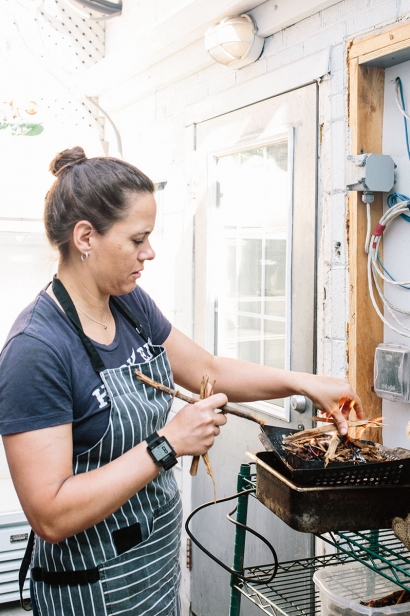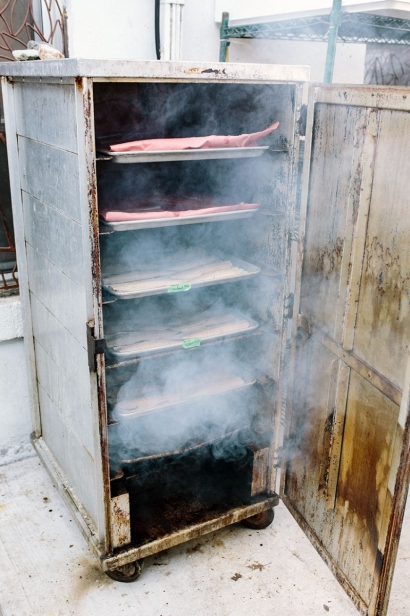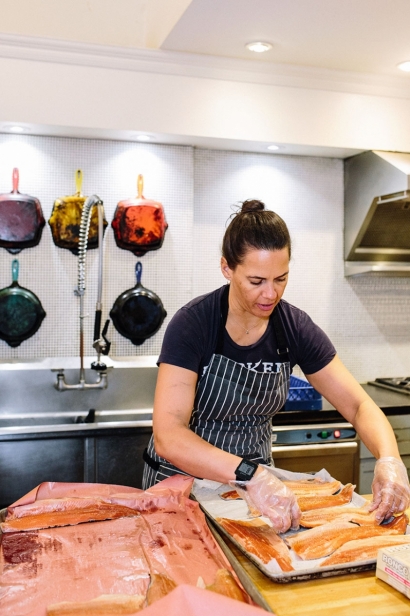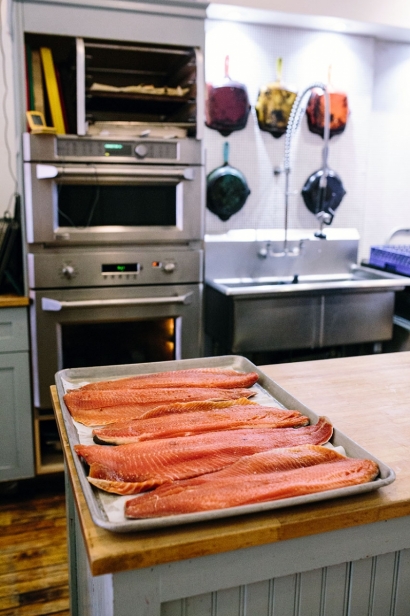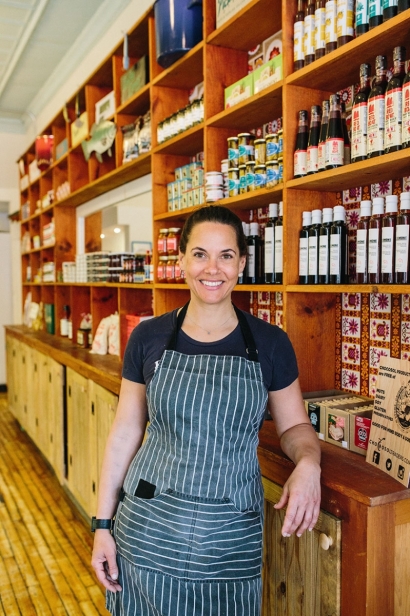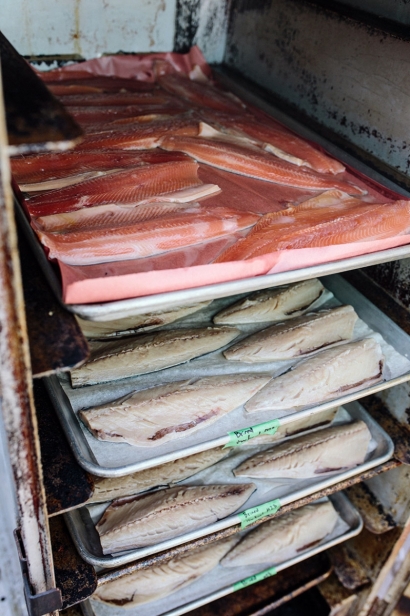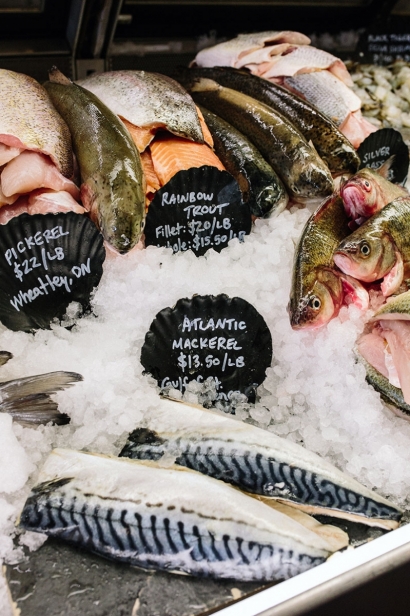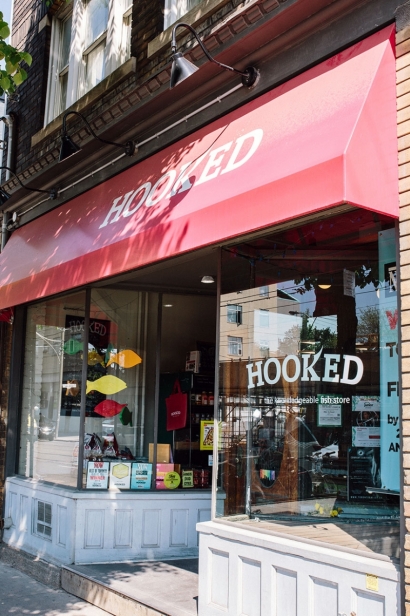Ontario Smoked Salmon
Should you find yourself picnicking on smoked Atlantic salmon along the shores of Lake Ontario this summer, the fish you’ll be eating won’t have come from the lake unless you caught and smoked it yourself. As fishy as that may sound, there are no longer any freshwater salmon fisheries in Ontario. All retail smoked Atlantic salmon comes from the East Coast, West Coast or through imports.
As we will see, this sad story had its genesis back in the 1700s, when European settlement and early industrialization caused the once plentiful Atlantic salmon to begin a long downward arc leading, by the closing years of the 19th century, to its extirpation from Lake Ontario.
But if that picnic won’t work without some form of locally sourced smoked fish on your plate, the eating can still be good. Of course, you’ll want those fish to be responsibly sourced — known to have come from a verified location, without harm to either the habitat, the fish population or the local environment.
There are a number of local suppliers that can help you fill your plate with something suitable.
Hooked Inc. is a Toronto-based fish store and restaurant supplier that is something of a lighthouse guiding consumers toward responsibly sourced fish. Hooked boasts that they “know who caught our fish, where they caught it, how they caught it and when they caught it.”
Hooked was founded by Daniel and Kristin Donovan, both chefs who had long lamented the lack of any fish retailer in Toronto who sold fish they trusted enough to feed their family. “The fish wasn’t fresh, or we couldn’t figure out where the fish was from, or when the fish had been caught, or how the fish had been caught. There just was no traceability and transparency,” Kristin says. To ensure they’re sourcing only the best fish, Hooked forms direct relationship with small boat fishers and co-operatives, and doesn’t go through distributors.
Hooked smokes a variety of Ontario fish using applewood from Avalon Orchards, an organic apple farm in Simcoe County. encourages consumers to broaden their smoked fish palate: “It’s like any kind of charcuterie — you want to try new things and different things.” She describes her hot-smoked rainbow trout as “slightly sweet with a nice fat content,” her hot-smoked whitefish as “juicy and fatty” and her hot-smoked pickerel as “meaty and earthy.”
One way to determine whether a fish has been responsibly sourced is to look for certification from Ocean Wise, a non-profit organization that works to increase appreciation of global waters and of safe and sustainable ways to harvest the fish within them. Ocean Wise has a list of fish that can be responsibly sourced from waters in and around the Great Lakes — including walleye (also called pickerel), lake whitefish, yellow perch, rainbow smelt, rainbow trout (also called steelhead trout), brown trout, whiteleg shrimp (also called Pacific white shrimp or king prawn) and tilapia. If you’re going to eat fish from afar, look for responsibly sourced fish carrying the Aquaculture Stewardship Council (ASC) or Marine Stewardship Council (MSC) certification. And if the fish you're about to buy isn't certified, ask the fishmonger where it came from. If they can't assure you it came from a good place, don't buy it.
David Owen, owner of De La Mer, a Toronto fish store with three locations, has noted a lack of demand for locally smoked fish. “A lot of our customers who like smoked fish tend to be European,” he says. “Sometimes the Canadian palate isn’t quite as open to things other than traditional cold-smoked salmon.” To cultivate his customers’ willingness to try the less popular fishes, Owen gives generous fish samples at the counter. “We find that helps break down that barrier,” he says.
Mike Taylor, owner of The Smoke Bloke, has also noticed his customers’ preference for mild-tasting smoked fish. He says 95 per cent of his sales come from cold-smoked Atlantic salmon, while only five per cent come from the stronger tasting hotsmoked rainbow trout.
But the fixation on salmon doesn’t merely reflect unadventurous palates. The fact is that eating assertively flavoured local fish in any quantity would require a lot of local smokeries — and those are thin on the ground.
Fish smokeries have fallen prey to industrialization, much like the Atlantic salmon. Regulations imposed a few years ago by the Canadian Food Inspection Agency and the Ministry of Natural Resources sank many small smokeries, which couldn’t afford expensive retrofits; where there were once upwards of 100 of them in Ontario, there are now just a handful.
Currently, smoke houses are regulated by the Ontario Ministry of Agriculture, Food and Rural Affairs (OMAFRA). The rules are still strict, but Donovan and Owen believe that OMAFRA truly wishes to help smokeries achieve compliance.
Of course, Atlantic salmon is among the most preferred of fish and yet its final disappearance, more than a century ago, from Lake Ontario is a now-obscure tale unknown to most Ontarians.
After the last ice age, 11,000 years ago, the vast glaciers that covered Canada melted, leaving behind a web of waterways connecting landlocked lakes to the Atlantic Ocean. Atlantic salmon eventually found themselves in the enormous and bountiful waters of Lake Ontario, where they decided to stay for good. For thousands of years, they were a staple food for the First Nations living around Lake Ontario.
The demise of Lake Ontario salmon began back in the 1700s, when European colonialists began cutting down forests to make way for agriculture. Many waterways, having lost their tree cover, became too warm for the spawning cold-blooded salmon. Industrialization brought further stresses; mills and dams blocked salmon from swimming upstream while sawmills released enormous quantities of sawdust that settled to the bottom of rivers and streams, preventing the fish from depositing their eggs in the gravel. By 1896, Atlantic salmon were officially declared extinct in Lake Ontario.
Remarkably, there are people who have refused to accept the Atlantic salmon's disappearance. Bring Back the Salmon is a restoration campaign that aims to create a self-sustaining Atlantic salmon population in Lake Ontario by 2025. Launched in 2006 by the Ontario Federation of Anglers and Hunters and the Ministry of Natural Resources, the program’s core pillars consist of fish stocking, habitat rehabilitation, research and education. A full 12 years into the program, Atlantic salmon now swim in Lake Ontario once again, but, to the detriment of most lakeside picnics, only licenced recreational anglers can catch and smoke them.
Aficionados will know that there are two main ways to smoke salmon — cold-smoking and hot-smoking.
Cold-smoked salmon is first cured with a dry rub of sugar, salt and sometimes herbs or spices. The sugar and salt draw moisture out of the meat, which aids in preservation, and the sugar offsets the saltiness. Cold smoking happens over smouldering wood between 28C and 32C, temperatures that aren’t hot enough to cook the fish. The goal is to impregnate the meat with smoky flavour and lightly dry it, which prevents spoilage while retaining enough moisture to yield that melt-in-your-mouth texture.
Hot-smoked salmon, on the other hand, is brined and cooked over heat between 70C and 80C — leaving the meat dry and salty enough to repel bacteria and reduce spoilage. The low moisture content imparts a strong flavour and flaky texture.
Even with local sources gone, Ontarians continued to get their salmon fixes. For a time, we happily noshed on Atlantic and Pacific salmon from both coasts. You might envision wild catch drawn from icy coastal waters, but nowadays, no. Canada’s last commercial Atlantic salmon fishery closed in 2000 — now all Canadian store-bought Atlantic smoked salmon comes from fish farms on the east and west coasts.
Fish farming can be controversial, particularly when open-net pens are used. Since this method allows seawater to flow freely in and out, disease and parasites that develop in the pens can flow freely out to sea, potentially infecting wild populations. Moreover, caged fish can escape and interbreed or compete with other fish species, threatening their chance for survival.
Leaders in the fish industry now favour closed containment pens on land — essentially very large aquariums. Unfortunately, no firm standards for such land-based aquaculture have yet been established. Some fish farms crowd the containers or feed the fish with chicken or other animal byproducts, leaving the fish susceptible to illness and sometimes forcing the use of antibiotics. As closed containment aquaculture technology develops and demand grows, Atlantic salmon might become commercially viable in Ontario once again. Until then, you’ll have to get licenced, catch it from the lake and smoke it yourself. And if you don’t have time for fishing and smoking before your next brunch party, try serving other smoked fish from the Great Lakes. Your guests will be happy — and so will you.
Hooked Inc.
888 Queen St. E., Toronto, Ont.
hookedinc.ca | 416.828.1861 | @hookedinc
De La Mer
291 Roncesvalles Ave., Toronto, Ont.
delamer.ca | 647.649.3912 | @delamerto
The Smoke Bloke Smoked Salmon and Fine Smoked Foods
1171 Victoria Park Ave., Toronto, Ont.
thesmokebloke.ca | 647.349.6300 | @thesmokebloke


